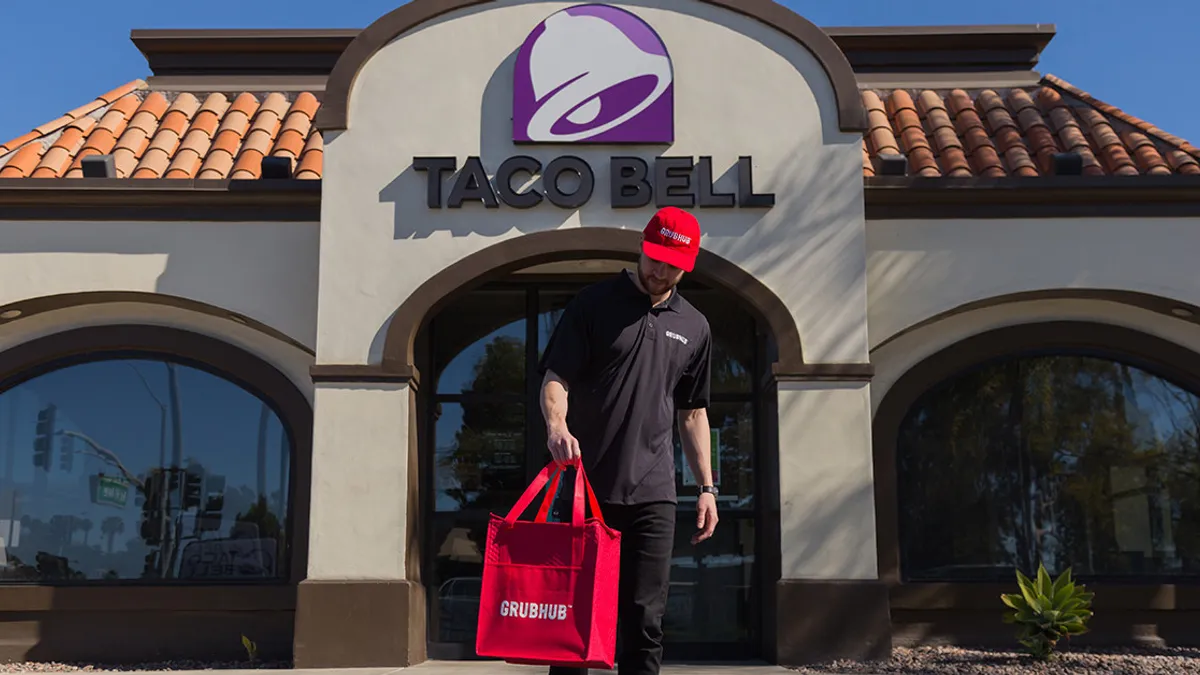UPDATE, Jan. 10, 2020: A Grubhub spokesperson told Restaurant Dive in a statement, "there is unequivocally no process in place to sell the company," contradicting The Wall Street Journal's report. The company added that it always consults advisors on various issues, including potential acquisitions. Grubhub's spokesperson said that with the pressures of profitability among its competitors, the company believes there will likely be strategic opportunities to acquire this year, and its "profitability is secure."
Dive Brief:
- Grubhub has hired financial advisers to explore strategic options including an acquisition or sale, The Wall Street Journal reports.
- The review is in nascent stages, the Journal reports, and will also address next steps in case an activist investor becomes involved in proceedings.
- Grubhub's value has fallen to roughly $4.5 billion from $13 billion around a year ago.
Dive Insight:
Once an unchallenged power in the delivery space, Grubhub's off-premise empire has been gobbled up by faster, more aggressive upstarts over the years. Rumors of a sale sparked calls for additional consolidation within the delivery segment from the investor community. Consolidation has been long expected in the industry, with analysts previously telling Restaurant Dive the U.S. market will eventually have two to three dominant providers in the space and that the current number of providers is too much. Given the ongoing pressures of profitability, Postmates has also had to temper rumors over potential sales in the past. It, along with DoorDash, have mulled IPOs, but have delayed listing following intense investor scrutiny of the segment. DoorDash may instead use a direct listing to go public.
In recent months, Grubhub has tried to reclaim its eroding market share by listing non-partnered restaurants on its platforms. The company has tried the tactic in the past, but the practice slowed delivery times and hurt service quality, CEO Matt Maloney told investors during an October earnings call.
Things are already off to a rocky start this time around, as well. The move angered several restaurant owners, who complained on Facebook that they had been placed on Grubhub's platform without permission. Operators also claimed the delivery company listed outdated menus on its website, frustrating customers whose orders couldn't be fulfilled.
Grubhub was also accused of "cybersquatting" and registering 23,000 domain names without the restaurants' permission, and investigated over customer claims that the company imposed hidden fees on restaurants when diner phone calls didn't result in food orders.
It seems that all these efforts to turn sales around have done is further tarnish Grubhub's reputation. In September, Grubhub's share of spend slipped from 30% to 22% while DoorDash's slice grew from 27% to 35%. In December, DoorDash was named the fastest growing brand in the U.S., while Grubhub ranked 13th. DoorDash also ranked second in brand awareness, while Grubhub didn't place at all — despite hiking its marketing and sales spending by 45% during Q3 2019 to $72 million.
And while Grubhub's recent deals with Yum Brands, Dine Brands, McDonald's and Panera could help grow brand awareness and cement delivery customer loyalty, Maloney said, it has a long road ahead before if it wants to nip at DoorDash's heels.
If Grubhub goes after an acquisition, there aren't a ton of options for it to buy. Waitr has been struggling despite its purchase of Bite Squad, however, and could be small enough for Grubhub to absorb without financial strain. Still, it seems unlikely the beleaguered platform would be the shot in the arm Grubhub needs to recapture its former glory.














